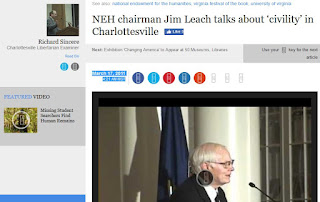From the Archives: NEH chairman Jim Leach talks about ‘civility’ in Charlottesville
Publisher's note: This article was originally published on Examiner.com on March 17, 2011. The Examiner.com publishing platform was discontinued July 1, 2016, and its web site went dark on or about July 10, 2016. I am republishing this piece in an effort to preserve it and all my other contributions to Examiner.com since April 6, 2010. It is reposted here without most of the internal links that were in the original.
NEH chairman Jim Leach talks about ‘civility’ in Charlottesville
March 17, 2011 4:21 AM MST
On the evening of March 16, in the historic Dome Room of the Rotunda at the University of Virginia, Jim Leach, chairman of the National Endowment for the Humanities, addressed the topic of “Civility in a Fractured Society,” as part of the 17th annual Virginia Festival of the Book.
After his formal remarks, Leach, a former Republican congressman from Iowa, spoke one-on-one with the Charlottesville Libertarian Examiner about civility in politics and the role of the humanities in American society.
Promoting argumentation
“Civility is not about dousing strongly held views,” Leach said. “It’s about making sure that people are willing to respect other perspectives.”
Those who feel “uncivil speech” is important, he continued, “have the effect of drowning out the ideas of others."
Civility, therefore, “is designed to promote argumentation on the assumption that argumentation is important to society and that, if you don’t have good argumentation, there’s a tendency towards dogmatism (which means that people never can change their views) or towards tyranny (which means that people in public life can act with abandon),” Leach asserted.
The United States, he added, “was founded on the notion of good civil argumentation. That’s what the town meeting -- that’s what the House of Burgesses -- was intended to symbolize.”
NEH and 50 state councils
On the role of the NEH, Leach explained that “America is very decentralized in how it supports the humanities, unlike European countries where virtually everything stems from the central government. The vast majority of support for the humanities is non-public. That doesn’t mean that the public [sector] doesn’t have a helpful role or a symbolic role but America in the humanities is vastly more decentralized than any place in the world and this is good.”
The National Endowment for the Humanities, which Leach heads, has cooperative agreements with 50 state humanities councils.
“The state humanities councils have some of the finest community leaders in America,” who each year run over 50,000 programs, which are largely aimed at adult and civic education. They range “from poetry and literature to history and anthropology,” Leach noted.
“They’re extraordinarily well-received programs,” he said, adding as an aside that “Virginia has one of the finest councils in the country” – referring to the Virginia Foundation for the Humanities, the sponsor of his speech at UVa, and calling it “one of the best led” of the state organizations.
Leach also noted that the NEH is a “leading research-support institution.” In its absence, he said, “a lot of research would not happen.”
‘Upsurge of interest’
Asked about a recent report issued by the National Endowment for the Arts (NEA) that shows a decline in arts participation by so-called “omnivores” (people who enjoy aspects of high-brow, middle-brow, and low-brow cultural activities), Leach replied optimistically.
“There are a huge number of alternatives for time in American society,” he explained. “We have seen in the humanities an upsurge of interest, partly possibly related to economic decline.” As an example, he noted, “the number of people going to museums is going up, not down.”
Moreover, Leach added, “the interest in ideas is escalating and not contracting. People are trying to get a sense of where they are, what’s happening, why is it happening, what [they can] do about it.”
The humanities, he said, “are the best place to go to find out one’s place in the sun.”
He offered several illustrations:
“If you read literature, you put yourself in somebody else’s shoes. You learn from great figures in literature. You can learn lessons not to repeat from [those who] might be considered characters that you don’t identify with.
“History provides a sense of where we’ve been and lessons that can be taken forward.
“Philosophy gives one a barometer [of] ethics of how we could and should lead our life,” he continued, “so I think the humanities have never been more important, particularly as the world becomes so change-intensive.”
No wonder, then, that Leach concluded the interview by smiling and saying, “I’m fortunate to lead an institution that is absolutely wondrous.”
NOTE: Video of Jim Leach's presentation at the 2011 Virginia Festival of the Book can be seen here: Part I (also above), Part II, Part III, and Part IV.




No comments:
Post a Comment